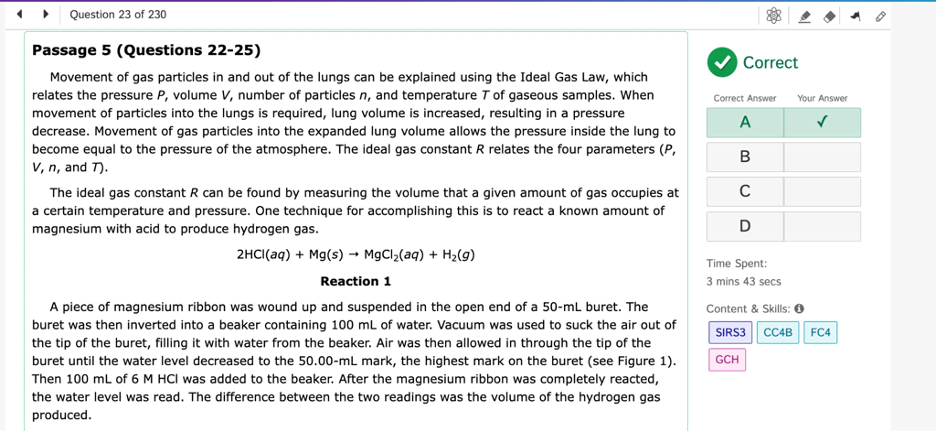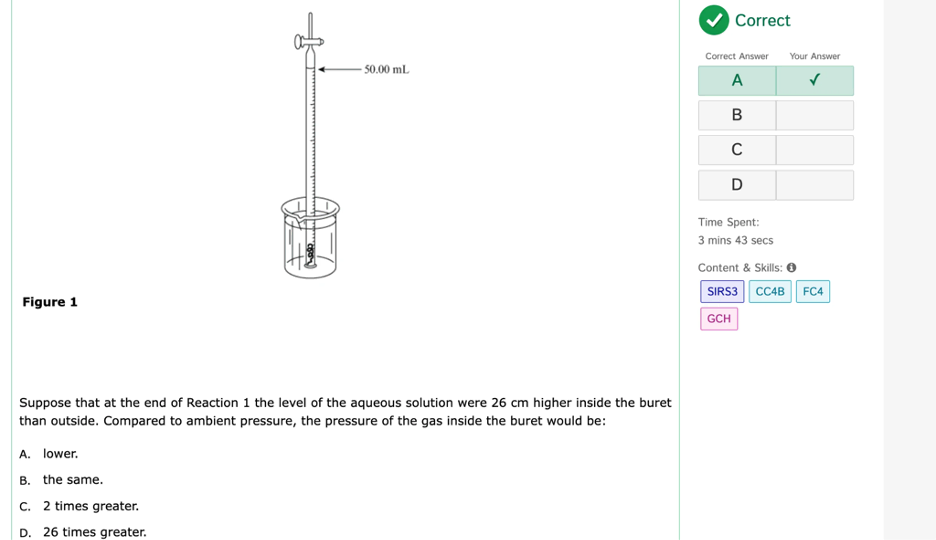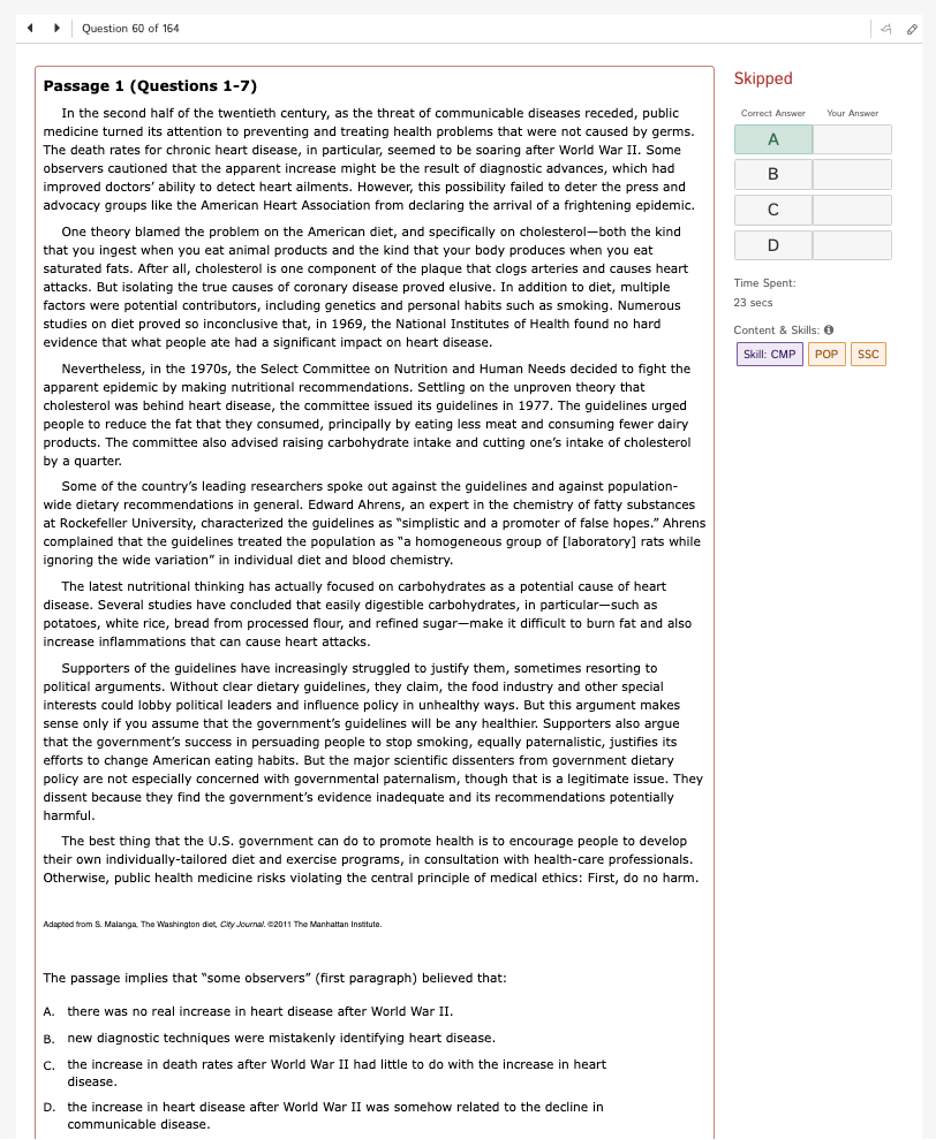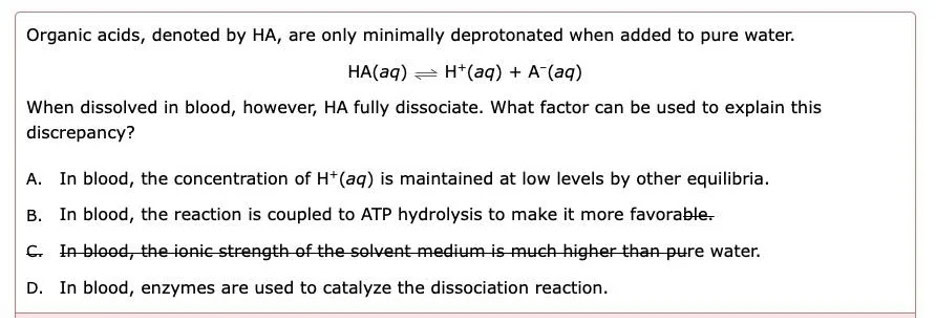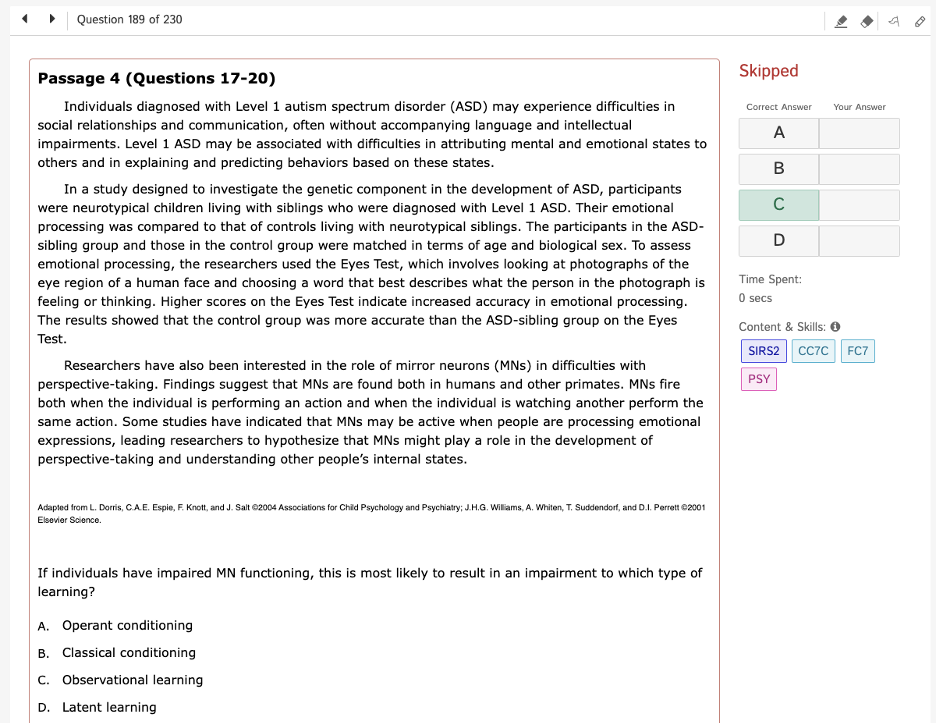
Table of Contents
The MCAT is a 7.5-hour, multiple-choice medical college admission test for pre-meds. You need a good MCAT score to get into med school. To get a competitive score, you need to extensively prepare to excel in all four sections.
This table gives you a snapshot of what to expect in each section. To view more details on how to prepare for a specific section, click on the section title or scroll down.
| Sections | Time | Questions | Format | Academic Disciplines |
| 1. Chemical and Physical Foundations of Biological Systems (Chem/Phys) | 95 minutes | 59 | Combination of passage-based and discrete | 30% general chemistry 25% first-semester biochemistry 25% introductory physics 15% organic chemistry 5% introductory biology |
| 2. Critical Analysis and Reasoning Skills (CARS) | 90 minutes | 53 | All passage-based | 50% humanities 50% social sciences |
| 3. Biological and Biochemical Foundations of Living Systems (Bio/Biochem) | 95 minutes | 59 | Combination of passage-based and discrete | 65% introductory biology 25% first-semester biochemistry 5% general chemistry 5% organic chemistry |
| 4. Psychological, Social, and Biological Foundations of Behavior (Psych/Soc) | 95 minutes | 59 | Combination of passage-based and discrete | 65% introductory psychology 30% introductory sociology 5% introductory biology |
Sections 1, 2, and 3 focus on a combination of your scientific inquiry and reasoning skills. CARS, which occurs second during your test day, is different from the other three sections. It doesn’t test your science knowledge. Instead, it’s designed to test your reading, critical thinking, and reasoning skills. It is also slightly shorter than the other sections.
Because of the frequency in which they appear on the test, certain science subjects and content are considered high-yield topics that will make your study time the most efficient. Many of these areas are major topics of study in your prerequisite science courses, and you’ll need to have a solid understanding of these concepts as a medical student.
All four sections are scored from 118-132, meaning that your potential total MCAT score ranges from 472-528.
The MCAT is the most important test you’ll ever take; don’t leave your score to chance. Students who work with MedSchoolCoach score an average of 12 points higher than their previous test or practice test scores!
1. Chemical and Physical Foundations of Biological Systems (Chem/Phys)
Number of questions: 59 multiple-choice
Time to complete: 95 minutes
Question format: Combination of passage-based and discrete
Disciplines:
- 30% general chemistry
- 25% first-semester biochemistry
- 25% introductory physics
- 15% organic chemistry
- 5% introductory biology
Also known as Chem/Phys, this part of the MCAT tests how well you understand the principles of chemistry and physics that define how the human body functions.
You’ll see us refer to “passage-based” and “discrete questions” as we define the details of each of the MCAT sections. All questions on the MCAT are multiple-choice, but they’re not all structured exactly the same. Here’s the difference:
Passage-based questions require you to read a passage and critically apply your knowledge to answer. These passages describe scientific experiments, theories, or phenomena related to chemistry and physics.
Discrete questions are more direct MCAT questions that require you to recall information without interpreting a passage of information. They test your direct knowledge and comprehension of chemistry and physics principles, not so much your critical thinking.
On test day, you’ll need to consider how much time you have to answer each question as you review these MCAT sections. You have just over a minute and a half per question on the MCAT.
Preparation Strategies
Break out your physics and chemistry notes. You’ll need to use reasoning and problem-solving skills to connect the dots between different scientific concepts.
I suggest brushing up on these key concepts:
- Periodic table & trends
- Amino acids (structure & function)
- Lipids (structure & function)
- Carbohydrates (classification, nomenclature, & function)
- Protein (structure & function)
- Enzymes & enzyme kinetics
- Nucleotides & nucleic acids (structure & function)
- Thermodynamics (free energy & equilibrium constants)
- Kinetics (reaction rates)
- Temperature & phase changes
- Chromatography techniques
- Aldehydes, ketones, alcohols, carboxylic acids, & acid derivatives (nomenclature & reactions)
Download ourMCAT Equation Sheet to memorize every equation you need to know for Chem/Phys. From Coulomb’s Law to the Doppler Effect to the Arrhenius Equation, it’s all there!
Example Question
Check out this question from the Chem/Phys section of the Free MCAT Sample Test provided by the Association of American Medical Colleges (AAMC).
The solution is A. If the pressure of the gas inside the buret were the same or higher than atmospheric pressure, the level of the solution inside the buret would be the same or lower as outside, corresponding to answer choices B, C, or D. But the question states that the solution inside the buret is higher than it is outside. Therefore, neither B, C, or D can be correct, leaving answer choice A.
2. Critical Analysis and Reasoning Skills (CARS)
Number of questions: 53 multiple-choice
Time to complete: 90 minutes
Question format: All passage-based
Disciplines:
- 50% humanities
- 50% social sciences
The Critical Analysis and Reasoning Skills section of the MCAT is the most unique of all four sections. It doesn’t test any science knowledge. Rather, CARS tests your critical thinking and reasoning skills by requiring you to interpret a passage of information.
The structure and intent of CARS are similar to reading comprehension sections on other standardized tests. Passages come from a variety of humanities and social sciences disciplines, so don’t be shocked if the content has seemingly little to do with medicine.
Here is a breakdown of the types of CARS section questions:
- Foundations of Comprehension, 30%
- Reasoning Within the Text, 30%
- Reasoning Beyond the Text, 40%
Foundations of Comprehension questions evaluate your understanding of individual sentences in the passage.
Reasoning Within The Text questions require you to integrate information from different parts of the passage to infer the author’s overall meaning, intent, or beliefs, or they may require you to evaluate the validity of the author’s arguments.
Reasoning Beyond the Text questions require you to extrapolate passage ideas to new contexts or assess how new information affects passage ideas.
Half of CARS passage content will cover the humanities, while the other half will cover social sciences. The subject of CARS passages may involve ethics, philosophy, population health, diverse cultures, anthropology, art, history, and more.
Preparation Strategies
Because CARS requires speedy reading and covers often non-medical subjects, a majority of test-takers say that CARS is the hardest MCAT section. I recommend practicing with CARS-specific testing resources daily to get ready. There are plenty of practice tests and sample CARS questions available.
Hone your reading speed, comprehension, and retention skills. You don’t want to sacrifice comprehension for speed, but you do only have less than a minute and a half per question.
Also be sure to review your CARS practice questions. Reviewing the questions you get wrong in practice is the key to improving your score. Try to figure out why you got each question wrong and devise a strategy for preventing similar mistakes on Test Day.
How to Answer CARS Questions
For all passage-based questions, but especially for CARS questions, here’s my strategy. I first read the passage, mentally summarizing each paragraph, and use the highlighting tool to emphasize phrases that are important for the passage’s meaning. Then I answer each question, using process of elimination to get rid of options and speed things up.
If I get stuck on a question, I just make an educated guess and use the flag feature to make a note of it. After I’ve answered all the questions, I use the remaining time to revisit the flagged questions. Remember – easy MCAT questions are worth the same as difficult ones. So make sure you answer ALL the easy questions before spending too much time on the hard ones.
Skip the endless practice passages and stubborn low scores. This CARS video course will teach you the strategies our tutors used to score in the 95th percentile or above on CARS.
Example Question
In this sample question from the AAMC’s Free MCAT Sample Test, you can see how CARS differs from other MCAT questions. This question more closely resembles something you’d see in the Verbal section of the SAT than in any of your prerequisite courses for med school.
The correct answer is A. In paragraph 1, the author writes that “some observers” thought that the increase in heart disease deaths was merely “apparent” and that improved “ability to detect heart ailments” might be a better explanation. This suggests some felt like there was no increase in heart disease (as stated by Option A) and that the soaring numbers were the result of improved diagnostics.
3. Biological and Biochemical Foundations of Living Systems (Bio/Biochem)
Number of questions: 59 multiple-choice
Time to complete: 95 minutes
Question format: Combination of passage-based and discrete
Disciplines:
- 65% introductory biology
- 25% first-semester biochemistry
- 5% general chemistry
- 5% organic chemistry
Also referred to as Bio/Biochem, this MCAT section tests your knowledge of basic biology, biochemistry, organic chemistry, and general chemistry.
Read Next: MCAT Test Dates
Preparation Strategies
To prep for the Bio/Biochem section, you need to consistently study the primary concepts, and practice, practice, practice with the passages and questions! I found that making my own flashcards was incredibly effective. Review practice questions to determine your scientific knowledge gaps, and tailor your study time to strengthen these areas.
On the other hand, a lot of what you think are “knowledge gaps” on the MCAT may be actually misinterpretations of the passages or confusion based on your own presuppositions. Consistently review your wrong answers to passage-based MCAT questions. That will help improve your ability to interpret passage content.
Here are some key concepts to focus on when studying for Bio/Biochem MCAT prep:
- Amino acids (structure & function)
- Carbohydrates (classification, nomenclature, & function)
- Gel electrophoresis & blotting techniques
- Protein (structure & function)
- Enzymes & enzyme kinetics
- Nucleotides & nucleic acids (structure & function)
- Glycolysis & gluconeogenesis
- Citric acid cycle
- Beta oxidation & fatty acid synthesis
- Electron transport chain & ATP synthase
- Transcription & translation
- Chromosomes
- Gene expression (in prokaryotes & eukaryotes)
- DNA replication & repair
- Thermodynamics (free energy & equilibrium constants)
- Nervous system (structure & function)
- Nervous system disorders (biological bases, symptoms, & treatments)
- Neurotransmitters
Study Tips: The Best Strategies for Doing Math on the MCAT
Example Question
Below is a sample question from the Bio/Biochem section of the AAMC’s Free MCAT Sample Test. I hope you remember Le Chatelier’s principle.
Notice how this is a discrete question — not a passage-based question. Discrete questions require you to know foundational concepts, like the dissociation of acid in blood. A passage-based question would have given you the full context of a situation and asked you to interpret the passage.
BTW, the answer here is A — here’s why. If HA is “fully dissociated” in blood, it means that the reaction favors the products. According to Le Chatlier’s principle, the reaction equilibrium will favor the products if the concentration of the products is kept low. Since, H+ is a product in the reaction above, A is the correct answer because it states that the concentration of H+ is kept low in the blood.
4. Psychological, Social, and Biological Foundations of Behavior (Psych/soc)
Also called Psych/Soc, the final MCAT section tests your understanding of psychology, sociology, and the behavioral sciences.
I would expect questions to specifically cover psychological theories, how social structures influence health, and what biological factors may impact behavior.
Disciplines featured in the Psych/soc section include:
- Introductory psychology, 65%
- Introductory sociology, 30%
- Introductory biology, 5%
Format and Timing
How many questions are on the Psych/soc section? 59 multiple-choice questions
How long is the Psych/soc section? 95 minutes
Psych/soc includes both passage-based and discrete questions.
Preparation Strategies
This is another section where you simply have to study the content. Be sure to work frequent review of the Psych/Soc concepts most likely to appear on the test into your study schedule.
Key Psych/soc concepts may include:
- Nervous system (structure & function)
- Nervous system disorders (biological bases, symptoms, & treatments)
- Neurotransmitters
- Brain areas that control language & speech
- Consciousness-Altering Drugs
- Sleep & Sleep Cycles
- Piaget’s Stages of Cognitive Development
- Heuristics & Biases
- Memory (encoding, types of memory, factors affecting recall)
- Theories of personality (psychoanalytic, humanistic, trait, & social-cognitive perspectives)
- Psychological disorders (symptoms & treatment approaches)
- Components of attitudes (cognitive, affective, behavioral)
Example Question
Below is a sample question from the Psych/Soc section of the AAMC’s Free MCAT Sample Test.
Notice how the focus of this question is on psychological and neurological concepts, rather than biological, chemical, or physical concepts, as in Chem/Phys or Bio/Biochem.
The correct answer is C. Observational learning can be summed up as learning through imitation. According to the passage, MNs are active when an “individual is watching another perform the same action.” This suggests that MN impairment might impair one’s ability to imitate, i.e. might impair observational learning.
Read Next: When Should You Take the MCAT?
FAQs
Yes, the MCAT sections are always presented in the same order, Sections 1-4:
- Chemical and Physical Foundations of Biological Systems
- Critical Analysis and Reasoning Skills
- Biological and Biochemical Foundations of Living Systems
- Psychological, Social, and Biological Foundations of Behavior
A majority of examinees say that CARS is the hardest MCAT section. CARS requires precise critical analysis of verbose, lengthy passages that often cover non-medical subjects.
The MCAT is made up of 230 entirely multiple-choice questions.
These questions are either discrete (requiring you to rely on your existing knowledge) or passage-based (requiring you to determine the answer by applying your knowledge of the science content to the passage information).
Sections 1, 3, and 4 of the MCAT exam contain a combination of passage-based and discrete questions. Section 2 (CARS) is made up of only passage-based questions.
It’s best to answer all MCAT questions, even if you have to guess or don’t have time to review them all. There’s no penalty for leaving questions blank, but by guessing, you’ll at least have a chance at getting a correct answer.
If you run out of time and have to answer several questions without reviewing them, you’ll have the statistically best chance of getting some of them right by selecting the same answer for each guessed answer (e.g., all “C”).
It takes 6 hours and 15 minutes to complete the MCAT test content, not including breaks. Including breaks, the tutorial, examinee agreement, and checking in, you can expect your test date experience to be about 7.5 hours long.
It’s a standardized exam, so you’ll be closely monitored on the computer-based testing program and won’t be able to take time beyond each section’s scheduled timeframe.
The average MCAT score for matriculants at MD programs is 511. This is a good target to shoot for if MD is your goal. DO applicants should aim for at least a 506 to have a chance at being competitive. A 515 puts you in the 90th percentile of test-takers, giving you a high chance of medical school acceptance.
Most med schools in the US and Canada require you to take the MCAT. Certain BS/MD, early assurance, and guaranteed acceptance programs allow students to skip the MCAT when applying to medical school, but these are incredibly selective and only open to students with very high grades and high school test scores.
You can take the test up to three times in one calendar year and four times across two calendar years, according to the AAMC. You cannot take the exam more than seven times in your lifetime.
Not showing up for a scheduled test and voiding your exam do count as attempts toward that lifetime limit.
Additional Resources
Your MCAT score is a major determinant of how you’ll do in the medical school admissions cycle. Don’t leave any doubt when you walk into the examination center that you’re as prepared as you can possibly be.
Here are some of the resources that will serve you best:
- MedSchoolCoach’s MCAT Practice Exams — The most representative practice exams on the market
- MCAT Go — An audio-only MCAT learning experience
- MCAT Prep App — Including videos, flashcards, and Q-banks at your fingertips
- MCAT CARS Mastery — A top-rated video course to get you ready for the CARS section
- MCAT Score Conversion Calculator — Get a scaled score from your AAMC practice exam
We offer several free MCAT study resources in addition to these.
However, the best way to prepare for the MCAT exam is to invest in tutoring. Our MCAT tutors all scored 99th percentile or higher on their respective sections, and they are well-versed in helping you devise a study strategy that fits your life, schedule, weak spots, and learning styles.
Our tutoring students improve their previous or practice exam scores by 12 points on average. Could you use 12 more points on the MCAT? If so, schedule a free consultation today to get started.

Ken Tao, PhD
Ken is the Director of MCAT and Research at MedSchoolCoach. He is an alumnus of UC Berkeley and Harvard University, boasts degrees in Bioengineering, Molecular and Cell Biology, and a Ph.D. in Neuroscience. Ken previously worked with undergraduate students at Princeton Review where he was the only tutor certified in all subjects. Ken was one of the highest rated MCAT tutors ever and a teacher trainer. He founded Magoosh's MCAT division and has written content for dozen's of MCAT books and guides.
